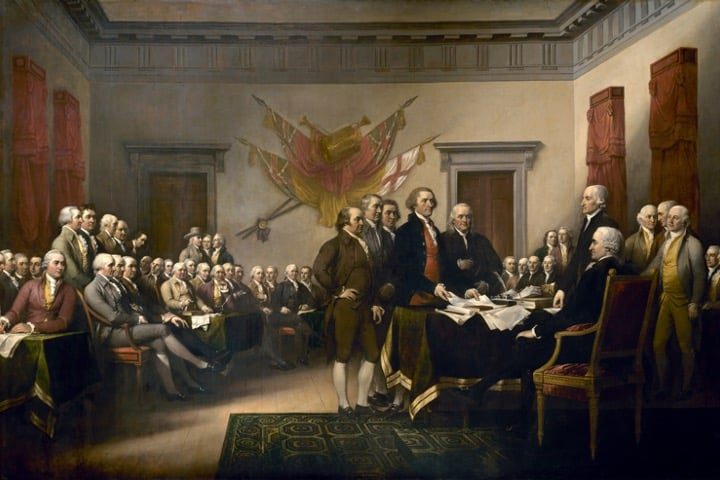
There’s a joke that goes, “My father died in 2015 after being a Republican his entire adult life.”
“He’s been voting Democrat ever since.”
But the powerful and famous get treated differently upon passing on — they can become scions of the Left. Republican Ronald Reagan, whom liberals impugned in the ’80s as stupid and racist, would be aghast at today’s GOP, some leftist commentators now aver. The implication is that he was a “reasonable” Republican, you see; why, they could maybe even vote for a Republican if only, by gum, he were just like the Gipper! (Never mind that, as a story I heard went, a person’s whole college class cheered upon hearing in 1981 that Reagan was shot.)
Then there’s Jesus, who, we’re told by many, was actually a socialist. Apparently, the Left has gone from the Cold War era’s “Better red than dead” to “When dead you turn red.” (Note: Before the Left co-opted blue, “red” was a color of the Left — of communists.)
And now the Left is at the memory-appropriation game again, and this time one liberal has truly jumped the shark:
Salon’s Kirk Swearingen claims, with an apparently straight literary face, that the Founding Fathers definitely were “woke” — “compared to the modern-day GOP.” Much as how the German Nazis attempted to remake Jesus’ faith with their “Positive Christianity,” Swearingen appears to be calling on fellow leftists to take a break from hating the Founders and defaming them as oppressors (and tearing down their statues), and instead co-opt their memories.
“It’s all relative,” he writes, “and if the relative standard is the troglodyte ideology of Donald Trump, Ron DeSantis and their various followers, hearkening back variously (and incoherently) to the Jim Crow era, the Confederacy and even medieval Europe, then the comparison is easy. With ideas gleaned from reading Greek and Roman philosophers and from the Enlightenment that surrounded them, the men who founded the United States were, given their era and their backgrounds, as ‘woke’ to the themes of justice and equality and universal human rights as could possibly have been expected of anyone.”
Since Swearingen’s comic-book rhetoric about Jim Crow, the (Democrat) Confederacy, and medieval Europe (which actually had its virtues) speaks for itself, I’ll begin by relating his theory. It is, in a nutty shell: The Founders were “woke” because they were the liberal iconoclasts of their time, seeking to overthrow an established order and norms.
Of course, by this rationale, “an eye for an eye” was woke because, as I explained last Friday, it prescribed relative leniency, essentially “stating that if someone stole your goat, all you could do was steal his goat.”
“You couldn’t burn down his house and kill his whole family.”
Also woke by Swearingen’s logic was Scandinavian pirate “Olvir the Child-Sparer” because, though party to brutal invasions, he refused to participate in the alleged Viking practice of casting babies airborne and catching them on a spear tip. Why, he was just like Mother Teresa!
The writer, predictably, also devotes much ink to boilerplate statements about the Founders’ slavery associations, but massages this by saying he doesn’t “believe in ‘presentism,’ the idea that we can hold people who lived in other times to the moral and legal standards of our own.” Fair enough. Yet while he won’t judge them by present standards, he will label them using the most present of terms — while misconstruing, or misrepresenting, what “wokeness” actually is and who the Founders actually were.
Swearingen says, for example, that “there is little room for doubt as to how they would view the right-wing mania for book banning, or the current Supreme Court’s efforts to tear down the walls between church and state.” He’s right, too: There is little doubt.
The Founders would be all for these things.
Putting aside that “book banning” is a false issue — everyone would limit what’s in school libraries based on some criteria (would leftists want KKK literature there?) — does anyone actually think our Founders, those 18th-century men, wouldn’t be aghast at books “teaching” children about homosexuality and “transgenderism”? In truth, they couldn’t even have imagined such abominations. They also believed states and localities could enforce community standards.
As for the “separation of church and state,” Swearingen is taking issue with Supreme Court opinions (summarized here) that combat the idea that religion should be completely purged from government institutions and program participation. Yet if the Founders really believed that a football coach should be forbidden from leading his players in Christian prayers (the subject of one recent SCOTUS case), why did they open the very first Congress (1789) with exclusively Christian prayers? Why did they allow this practice to continue (the body opens with mainly Christian prayers to this day)?
Furthermore, why did the Founders not take issue with the official state churches extant at America’s birth? Why did they allow those churches’ perpetuation by limiting the Establishment Clause prohibition to Congress (i.e., “Congress shall make no law…”) — our national Legislature — as opposed to applying it to all levels of government?
Lastly, note that far from being near and dear to the Founders, the “separation of church and state” principle did not make it into the Constitution precisely because it was a minority view in their time. This said and in fairness, Swearingen can take solace, as the separation phrase is a constitutional principle — only, it’s the 1936 Soviet constitution that it’s found in.
Summing up, Swearingen states the Founders were as “‘woke’ to the themes of justice and equality and universal human rights as could possibly have been expected of anyone.” Perhaps he hasn’t noticed, however, that some years back the “woke” crowd traded equality for “equity” — i.e., officially sanctioned discrimination ostensibly designed to achieve “leveling” (equality of outcome) — something the Founders explicitly warned against. The woke have also exchanged justice for “social justice” and, being absolutist-behaving relativists, don’t believe in moral universals.
Speaking of which, this is the problem with defining everything relatively. Swearingen is swearing, essentially, that because the woke are (by his lights) the most enlightened of our time and the Founders the most enlightened of their Enlightenment time, both groups are ideological brethren. Yet this is a bit like saying that the largest men in pygmy lands and the largest in Holland are all the “largest,” so they’d all fit in the same clothes.
Were the Founders resurrected, they’d have much to say to liberals and conservatives. But they’d be absolutely beside themselves at notions such as “transgenderism’s” and the victim-victimizer narrative’s validity, that border enforcement is “racist,” and that blacks should reject success-breeding habits (e.g., punctuality) as “white norms.” Subjected to such wokeness, they’d only want to wake up — being sure it was all a bad dream.



